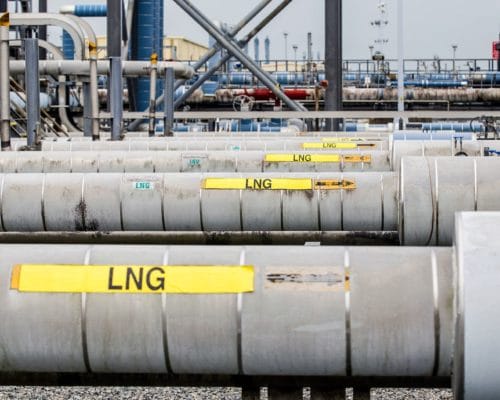Oil and Gas

LNG Prices in 2022 Bring Stability after 2021’s Volatility
Many experts predict that LNG prices will remain relatively high throughout 2022. This comes on the heels of record breaking prices across Europe and Asia in 2021. But what is the longer term outlook?

IPCC Report: Climate Finance for Adaptation Must Increase for Developing Countries
The latest IPCC Working Group II report largely stresses the need to accelerate climate adaptation, eradicate injustice and end the use of fossil fuels. The report, ‘Climate Change 2022: Impacts, Adaptation, and Vulnerability,’ emphasised that coal and other fossil fuels are choking humanity.

The LNG Outlook of the Philippines and Its Impact on the Country’s Future
In a world where gas is becoming the "new coal" in the eyes of financial institutions, governments and the public, the Philippines has to withstand the pressure to lock itself into a fossil fuel-powered future.
How the Oil and Gas Sector Can Drive Renewable Energy Growth
The oil and gas sector currently employs over 12.6 million people, but demand is shrinking. On the other hand, demand for renewable energy workers is increasing.
Oil and Gas Sector: The Prospects of a Transition Fuel
The oil and gas sector has a critical role to play in the energy transition. They are the most well-positioned to develop and deploy large scale renewable energy infrastructure. Asian financiers, like the ADB and AIIB, have stated that they will support this transition by no longer funding coal and oil projects. Yet, they will continue to fund natural gas, as many see it as a transition fuel while renewable energy capacity increases.
Natural Gas Outlook and Key Trends in Southeast Asia
Natural gas use in Southeast Asia will increase significantly over the next several decades. This is being fueled by governments and lenders alike. While this is a viable immediate alternative to coal and oil, it is not a long-term solution. Southeast Asian countries must continue working towards developing a robust renewable energy system.
Oil Majors Spend More on Spin, Less on “Green Hydrogen”
Several oil companies have stated goals to reduce their emissions. Often a key piece of this plan focuses on increasing natural gas production and investing in hydrogen energy. Unfortunately, there are many types of hydrogen energy and only one type is sustainable - green hydrogen. Currently, green hydrogen only accounts for a fraction of total hydrogen production.
Oil and Gas in India: What is the Way Forward?
Oil and gas play a major part of India's energy mix. Unfortunately, India remains focused on the sector, and is making substantial investment towards natural gas in the coming decades. This move remains at odds with global emissions targets and puts India at risk of missing the economic benefits of renewable energy development.
Denial by “Natural Gas Industry” and Greenwashing Practices
The oil and gas industry has been one of the most influential sectors over the past several decades, but there are signs that this may be changing. Public and private sentiment is shifting, and the spotlight is swinging towards renewables. In an attempt to slow this transition, many fossil fuel companies have increased lobbying and public outreach. Unfortunately, this has led to a rise in greenwashing. The reality is that change is happening, and it is in the best interest of these fossil fuel giants to shift with it, capitalizing on the changing market.
Investing in the Future of Hydrogen: A Path to Net Zero
Green hydrogen still accounts for a small percentage of total global hydrogen production. But it is a valuable, and necessary, energy source for the world to reach net-zero by 2050. This makes it a lucrative investment opportunity that has the potential to provide substantial returns in the coming decades.
Cheap Green Hydrogen and its Impacts on Asia’s Oil and Gas Industry
Much has been said about the trouble in decarbonising sectors like shipping and aviation, but...
Fossil Fuel Industry and the Media’s Role in Greenwashing
The fossil fuel industry has long relied on greenwashing. And in the last decade social media and increased internet use has made it much easier for this misinformation to reach consumers. Now it can be challenging to interpret true claims from greenwashed facts. It falls on the shoulders of consumers, regulators, and industry to clamp down on these tactics.
Global Methane Pledge COP26: Its Impact on Asia’s Oil and Gas Industry
In the build-up to the COP26 conference in Glasgow, all eyes were set on global leaders to make meaningful progress in addressing methane emissions, the second leading cause of climate change. While the Global Methane Pledge is a necessary first step, governments and the fossil fuel industry will have to do more if we are to remain on track to meeting the Paris Agreement goals. In the meantime, the oil and gas landscape in Asia will have to change.
Energy Transition in Oil and Gas Sector: A Dilemma
Asia will account for an estimated share of 43% of the global energy demand by 2040. Whilst fossil fuel projects are under pressure owing to climate commitments, renewables are not yet fully developed. Will the Asian countries bank upon oil and gas to fulfill the future energy demand?
Most Popular
Categories
-
9
-
33
-
126
-
4
-
17
-
43
-
52
-
11
-
10
-
15
-
24
-
6
-
6
-
247
-
195
-
13
-
23
-
1
-
1
-
23
-
38
-
41
-
84
-
18
-
81
-
41
-
17
-
10
-
40
-
43
-
86
-
284
-
21
-
39
-
35
-
10
-
41
-
36

